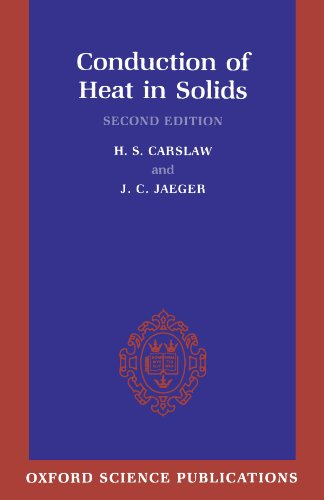Conduction of Heat in Solids book
Par varner john le vendredi, décembre 30 2016, 22:05 - Lien permanent
Conduction of Heat in Solids by H. S. Carslaw, J. C. Jaeger


Conduction of Heat in Solids H. S. Carslaw, J. C. Jaeger ebook
ISBN: 0198533683, 9780198533689
Format: djvu
Publisher: Oxford University Press, USA
Page: 517
There are three main forms of heat transfer which are commonly referred to within the process engineering industry: Conduction. ΔT = temperature difference between two systems. For example, if one end of a metal rod is heated up, the heat will gradually travel to the other end until the entire rod becomes hot. The book says at the introduction: "When different parts of a body are at different temperatures heat flows from the hotter parts to the cooler. I consulted for my work the book "heat conduction in solids" by H.S. Conduction is the mechanism by which heat is transferred within material objects and between material objects that are in physical contact with one another. Conduction is the phenomenon of transfer of heat through one part of the body to another, from particle to particle in the direction of fall of temperature without any actual movement of the particles. And Jaeger, J.C., Conduction of Heat in Solids, 2nd ed., Clarendon Press, Oxford, England, section 3.3, p. Students know heat flows in solids by conduction (which involves no flow of matter) and in fluids by convection (which involves flow of matter). The primary mode of heat transfer in solids is. Thermal conduction exists in solids, liquids and gasses. I don´t think it´s a good idea to model it as a continous solid because of the gap between the sand grains. Conduction can simply be thought of as heat transfer by “touch”, and only can occur in matter (solids, liquids and gases). Houses lose a lot of heat through their windows even when they're shut. Conduction and Convection Conduction is most important in Solids. Currently I should simulate the heat conduction through the pulverised materials (like sand) in CFX. Asked by: kunal 35 views Heat_and_Temperature · science-5th.